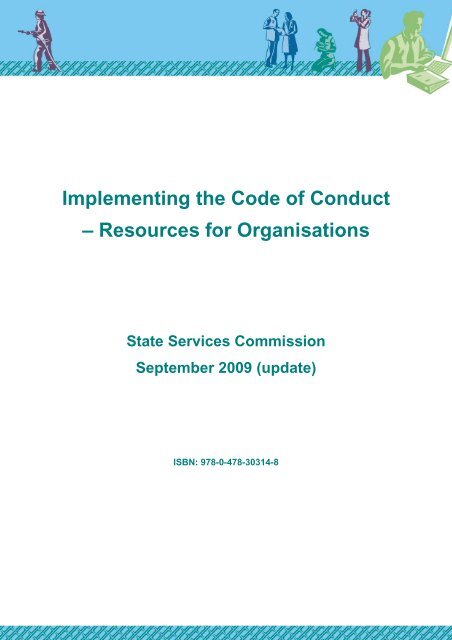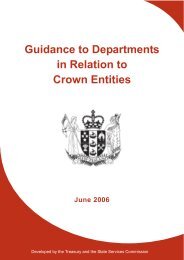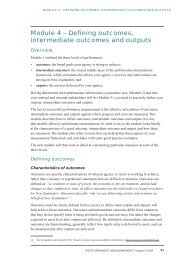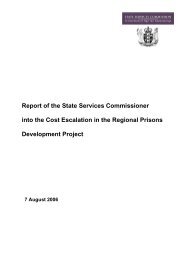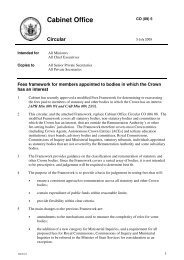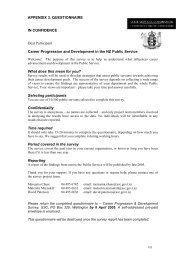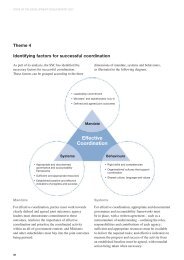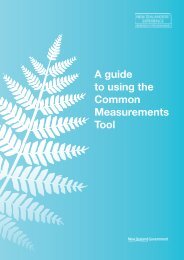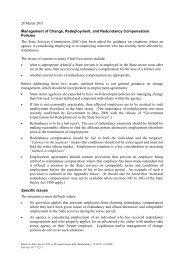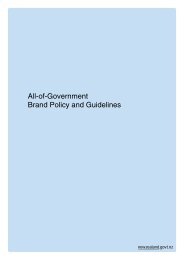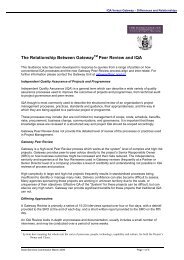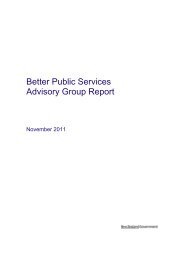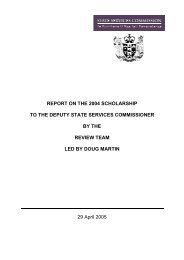Implementing the Code of Conduct - State Services Commission
Implementing the Code of Conduct - State Services Commission
Implementing the Code of Conduct - State Services Commission
You also want an ePaper? Increase the reach of your titles
YUMPU automatically turns print PDFs into web optimized ePapers that Google loves.
<strong>Implementing</strong> <strong>the</strong> <strong>Code</strong> <strong>of</strong> <strong>Conduct</strong><br />
– Resources for Organisations<br />
<strong>State</strong> <strong>Services</strong> <strong>Commission</strong><br />
September 2009 (update)<br />
ISBN: 978-0-478-30314-8
Background .................................................................................................................................. 3<br />
Checklist for Implementation....................................................................................................... 7<br />
Roles and Responsibilities ......................................................................................................... 11<br />
Suggested Policies and Procedures ............................................................................................ 14<br />
Fur<strong>the</strong>r Information Resources................................................................................................... 20<br />
2
Background<br />
The importance <strong>of</strong> trust in <strong>the</strong> <strong>State</strong> <strong>Services</strong><br />
New Zealanders’ trust in and respect for government is based on <strong>the</strong> integrity <strong>of</strong> our<br />
institutions, including <strong>the</strong> organisations across <strong>the</strong> <strong>State</strong> <strong>Services</strong>. The <strong>State</strong> <strong>Services</strong><br />
collectively implements <strong>the</strong> policies <strong>of</strong> <strong>the</strong> Government, providing and administering a wide<br />
range <strong>of</strong> public functions and services. <strong>State</strong> servants are guardians <strong>of</strong> what ultimately belongs<br />
to <strong>the</strong> public, and <strong>the</strong> public expects <strong>State</strong> servants to serve and safeguard its interests.<br />
Every <strong>State</strong> servant has a part to play in acting with integrity to maintain New Zealanders’<br />
confidence in <strong>the</strong> <strong>State</strong> <strong>Services</strong>. New Zealanders expect that <strong>State</strong> servants will behave<br />
ethically, and be conscientious and competent in <strong>the</strong>ir work. Misuse <strong>of</strong> a position or <strong>of</strong> powers,<br />
or a failure to meet expectations, causes people to lose trust in government. They <strong>the</strong>n do not<br />
seek <strong>the</strong> help <strong>the</strong>y are entitled to; do not provide information necessary for delivering effective<br />
services; resist paying tax; and become increasingly resentful <strong>of</strong> <strong>the</strong> <strong>State</strong> <strong>Services</strong>. A<br />
perceived integrity failure in one part <strong>of</strong> government can impact negatively on <strong>the</strong> opinion<br />
people hold <strong>of</strong> <strong>the</strong> <strong>State</strong> <strong>Services</strong> as a whole. It is <strong>the</strong>refore essential that all <strong>State</strong> servants seek<br />
to streng<strong>the</strong>n public trust in <strong>the</strong> <strong>State</strong> <strong>Services</strong> and that <strong>the</strong>y reinforce in <strong>the</strong>ir behaviour <strong>the</strong><br />
spirit <strong>of</strong> service.<br />
The New Zealand <strong>State</strong> <strong>Services</strong> is one <strong>of</strong> <strong>the</strong> most honest and transparent in <strong>the</strong> world. New<br />
Zealand is recognised internationally for its public administration being largely free <strong>of</strong><br />
corruption. Adherence to published standards and an expectation <strong>of</strong> high ethical behaviour<br />
contribute to this rating, and engender a level <strong>of</strong> public trust that <strong>the</strong> <strong>State</strong> <strong>Services</strong><br />
<strong>Commission</strong>er seeks to streng<strong>the</strong>n with a code <strong>of</strong> conduct.<br />
“We all work for <strong>the</strong> Government and have an obligation to <strong>the</strong> public to behave in a<br />
trustworthy way. Sharing high standards <strong>of</strong> integrity provides a unifying sense <strong>of</strong> values which<br />
must streng<strong>the</strong>n <strong>the</strong> <strong>State</strong> <strong>Services</strong> and improve New Zealanders’ trust in <strong>the</strong>m.”<br />
Mark Prebble (<strong>State</strong> <strong>Services</strong> <strong>Commission</strong>er from 2004-2008)<br />
3
The <strong>State</strong> <strong>Services</strong> <strong>Commission</strong>er’s role as leader on integrity and conduct<br />
The <strong>State</strong> Sector Act 1988 enabled <strong>the</strong> <strong>State</strong> <strong>Services</strong> <strong>Commission</strong>er to set minimum standards<br />
<strong>of</strong> integrity and conduct for Public Service departments, and consequently <strong>the</strong> Public Service<br />
<strong>Code</strong> <strong>of</strong> <strong>Conduct</strong> (www.ssc.govt.nz/coc) was issued in 1990. This described <strong>the</strong> core<br />
principles <strong>of</strong> public service and set out <strong>the</strong> standards <strong>of</strong> conduct required <strong>of</strong> public servants.<br />
The <strong>State</strong> Sector Amendment Act 2004 extended <strong>the</strong> <strong>Commission</strong>er’s mandate to provide<br />
advice and guidance on integrity and conduct to employees across <strong>the</strong> <strong>State</strong> <strong>Services</strong><br />
(excluding Crown research institutes), and to set minimum standards <strong>of</strong> integrity and conduct<br />
for most organisations in <strong>the</strong> <strong>State</strong> <strong>Services</strong> (i.e. <strong>the</strong> Public Service, Parliamentary Counsel<br />
Office, Parliamentary <strong>Services</strong>, and most Crown entities). This includes <strong>the</strong> power to issue a<br />
code <strong>of</strong> conduct setting minimum standards that can be added to, or made more detailed, to<br />
reflect an organisation’s circumstances.<br />
Before making any decision on <strong>the</strong> appropriateness <strong>of</strong> issuing a code, <strong>the</strong> <strong>State</strong> <strong>Services</strong><br />
<strong>Commission</strong> undertook through 2005/06 a comprehensive research project, “Engagement with<br />
Crown Entities” (www.ssc.govt.nz/standards-discussion-document). This project identified<br />
integrity provisions already in place in organisations, and explored whe<strong>the</strong>r setting additional<br />
standards could contribute to increased trust in government and confidence in <strong>the</strong> <strong>State</strong><br />
<strong>Services</strong>.<br />
A snapshot <strong>of</strong> current practices in <strong>the</strong> Public Service revealed a similar picture to that found in<br />
Crown entities: departments had varied processes to support <strong>the</strong> Public Service <strong>Code</strong> <strong>of</strong><br />
<strong>Conduct</strong>, and had developed additional provisions to suit particular circumstances.<br />
From this information, <strong>the</strong> <strong>Commission</strong>er decided to develop minimum standards that would<br />
be applied as a single code <strong>of</strong> conduct for <strong>State</strong> <strong>Services</strong> organisations. Qualitative research<br />
conducted with <strong>State</strong> servants and members <strong>of</strong> <strong>the</strong> public identified values and standards <strong>of</strong><br />
behaviour expected <strong>of</strong> <strong>State</strong> servants. From <strong>the</strong> results <strong>of</strong> <strong>the</strong> research, principles-based<br />
standards common to all organisations were developed for <strong>the</strong> code. These standards can be<br />
encompassed within <strong>the</strong> codes and training resources that many organisations already have.<br />
A purpose <strong>of</strong> <strong>the</strong> <strong>State</strong> Sector Act 1988, is to ensure that employees in <strong>the</strong> <strong>State</strong> <strong>Services</strong> are<br />
imbued with <strong>the</strong> spirit <strong>of</strong> service to <strong>the</strong> community, and that employees in <strong>the</strong> <strong>State</strong> <strong>Services</strong><br />
maintain standards <strong>of</strong> integrity and conduct. It provides for <strong>the</strong> appointment <strong>of</strong> departmental<br />
chief executives who will imbue <strong>the</strong> spirit <strong>of</strong> service, and imposes a duty on <strong>the</strong>m to ensure<br />
that all employees maintain proper standards <strong>of</strong> integrity, conduct, and concern for <strong>the</strong> public<br />
interest. The Crown Entities Act 2004 imposes a similar requirement on Crown entities to<br />
perform with a spirit <strong>of</strong> service to <strong>the</strong> public.<br />
4
The code – what it does and does not do<br />
Standards <strong>of</strong> Integrity and <strong>Conduct</strong> (www.ssc.govt.nz/code) seeks to reinforce a spirit <strong>of</strong><br />
service and sets common standards <strong>of</strong> behaviour required from <strong>the</strong> diverse range <strong>of</strong> people and<br />
roles across <strong>the</strong> <strong>State</strong> <strong>Services</strong>. It <strong>of</strong>fers a framework within which to make informed<br />
judgements when faced with competing interests and conflicting values – when <strong>the</strong> ‘right<br />
answer’ is not readily apparent.<br />
The code applies to organisations in <strong>the</strong> Public Service and to many Crown entities within <strong>the</strong><br />
<strong>Commission</strong>er’s mandate. (www.ssc.govt.nz/code-organisations)<br />
The code does not provide detailed explanations <strong>of</strong> appropriate behaviour in every situation.<br />
Instead, <strong>the</strong> standards reflect values that, with judgement, have universal application in all <strong>State</strong><br />
<strong>Services</strong> organisations. It is <strong>the</strong> responsibility <strong>of</strong> all <strong>State</strong> servants to comply with <strong>the</strong> code and<br />
to maintain <strong>the</strong> high level <strong>of</strong> trust between <strong>the</strong> <strong>State</strong> <strong>Services</strong> and <strong>the</strong> public, Ministers and<br />
Parliament.<br />
The Trusted <strong>State</strong> <strong>Services</strong> Development Goal<br />
In 2005 <strong>the</strong> Government agreed a set <strong>of</strong> six Development Goals for <strong>the</strong> <strong>State</strong> <strong>Services</strong><br />
(www.ssc.govt.nz/dev-goals-diagram), aimed at creating a world class <strong>State</strong> <strong>Services</strong>. The<br />
Development Goals collectively contribute towards streng<strong>the</strong>ning <strong>the</strong> degree <strong>of</strong> trust New<br />
Zealanders have in <strong>the</strong> <strong>State</strong> <strong>Services</strong>. The sixth goal is specifically about trust:<br />
Having organisations working toge<strong>the</strong>r to support <strong>the</strong> new code has helped to meet <strong>the</strong> June<br />
2007 milestone for <strong>the</strong> Trusted <strong>State</strong> <strong>Services</strong> Development Goal.<br />
The six elements that are essential to supporting trustworthy behaviour are:<br />
<br />
<br />
<br />
<br />
<br />
<br />
Agencies <strong>of</strong> <strong>the</strong> <strong>State</strong> <strong>Services</strong> have standards <strong>of</strong> integrity and conduct that meet <strong>the</strong><br />
minimum standards in <strong>the</strong> <strong>State</strong> <strong>Services</strong> <strong>Commission</strong>er’s code <strong>of</strong> conduct.<br />
Agencies <strong>of</strong> <strong>the</strong> <strong>State</strong> <strong>Services</strong> promote <strong>the</strong>ir standards <strong>of</strong> integrity and conduct.<br />
Standards <strong>of</strong> integrity and conduct are integrated into <strong>the</strong> behaviour <strong>of</strong> <strong>State</strong> servants.<br />
Managers model <strong>the</strong> standards <strong>of</strong> integrity and conduct in <strong>the</strong>ir behaviour.<br />
The consequences for behaviour that breaches <strong>the</strong> standards <strong>of</strong> integrity and conduct are<br />
known by <strong>State</strong> servants.<br />
Agencies act decisively when breaches occur.<br />
5
While <strong>the</strong> Development Goals brand was discontinued in 2009 <strong>the</strong> objectives for <strong>the</strong> wide <strong>State</strong><br />
<strong>Services</strong> have not changed and <strong>the</strong> SSC’s work programme is still focused on <strong>the</strong> <strong>the</strong>mes and<br />
objectives <strong>of</strong> <strong>the</strong> six Development Goals.<br />
Trustworthiness exhibited by <strong>State</strong> servants<br />
In 2007 <strong>the</strong> SSC undertook <strong>the</strong> New Zealand <strong>State</strong> <strong>Services</strong> Integrity and <strong>Conduct</strong> Survey to<br />
measure <strong>the</strong> trustworthiness <strong>of</strong> <strong>State</strong> servants*. Progress for this indicator has been assessed by<br />
relating <strong>the</strong> findings from this survey to <strong>the</strong> six elements that support integrity and ethical<br />
behaviour in <strong>the</strong> workplace.<br />
The overall findings from <strong>the</strong> survey are positive and in line with <strong>the</strong> high regard for <strong>the</strong> New<br />
Zealand public sector shown by international surveys <strong>of</strong> corruption. Almost all <strong>State</strong> servants<br />
reported that <strong>the</strong>ir agencies have written standards <strong>of</strong> integrity and conduct.<br />
While many agencies have a focus on integrity, <strong>the</strong>re is room for improvement under all six<br />
elements essential to supporting trustworthy behaviour. There is a continuing need to promote<br />
standards <strong>of</strong> integrity and conduct. More must be done to integrate <strong>the</strong>se standards into <strong>State</strong><br />
servants’ behaviour. The survey identified <strong>the</strong> role <strong>of</strong> senior managers in communicating <strong>the</strong><br />
importance <strong>of</strong> integrity and modelling good behaviour as a particular area for improvement.<br />
When senior managers are explicit in promoting a strong ethical culture, <strong>the</strong>y motivate <strong>the</strong>ir<br />
staff to act with integrity. Agencies must act decisively when breaches <strong>of</strong> standards occur and<br />
<strong>State</strong> servants must be clear about <strong>the</strong> consequences <strong>of</strong> breaching standards.<br />
The 2010 milestone for <strong>the</strong> Trusted <strong>State</strong> <strong>Services</strong> goal reinforces <strong>the</strong> importance <strong>of</strong> <strong>the</strong> six<br />
elements, stating that agencies will have <strong>the</strong> elements essential to supporting <strong>State</strong> servants’<br />
trustworthy behaviour in place by this time.<br />
The survey will be conducted again in early 2010 to provide a comparison with <strong>the</strong> 2007<br />
benchmark.<br />
* www.ssc.govt.nz/survey-report-summary<br />
6
Checklist for Implementation<br />
From 30 November 2007, organisations must:<br />
<br />
comply with <strong>the</strong> minimum standards <strong>of</strong> integrity and conduct set out in <strong>the</strong> <strong>State</strong> <strong>Services</strong><br />
<strong>Commission</strong>er’s code <strong>of</strong> conduct<br />
have in place policies and procedures that are consistent with <strong>the</strong> standards set out in <strong>the</strong><br />
code <strong>of</strong> conduct.<br />
The checklist below outlines <strong>the</strong> tasks that organisations may need to undertake when<br />
implementing <strong>the</strong> <strong>Commission</strong>er’s code <strong>of</strong> conduct. Some <strong>of</strong> <strong>the</strong> tasks will be vital for all<br />
organisations, while o<strong>the</strong>rs may be more or less relevant, depending on <strong>the</strong> organisation’s<br />
particular circumstances.<br />
The checklist is organised to reflect <strong>the</strong> six elements <strong>of</strong> trustworthiness (www.ssc.govt.nz/sdgreport06)<br />
that organisations are encouraged to use to work towards <strong>the</strong> Trusted <strong>State</strong> <strong>Services</strong><br />
Development Goal (www.ssc.govt.nz/dev-goals-diagram).<br />
I<br />
<br />
<br />
<br />
<br />
<br />
Agencies <strong>of</strong> <strong>the</strong> <strong>State</strong> <strong>Services</strong> have standards <strong>of</strong> integrity and conduct<br />
that meet <strong>the</strong> <strong>State</strong> <strong>Services</strong> <strong>Commission</strong>er’s minimum standards<br />
Ensure policies, procedures and training give effect to <strong>the</strong> <strong>Commission</strong>er’s standards.<br />
Rewrite any internal policies that are inconsistent with <strong>the</strong> code <strong>of</strong> conduct, and where<br />
necessary write new policies for <strong>the</strong> organisation that reflect <strong>the</strong> standards that are set out<br />
in <strong>the</strong> code.<br />
Ensure organisation-specific codes <strong>of</strong> conduct that apply additional or detailed standards<br />
are consistent with <strong>the</strong> <strong>Commission</strong>er’s code. Consider treating <strong>the</strong> <strong>Commission</strong>er’s<br />
code as <strong>the</strong> foundation code upon which <strong>the</strong> organisation can build.<br />
While employees are legally obliged to comply with <strong>the</strong> code whe<strong>the</strong>r or not <strong>the</strong> code is<br />
mentioned in <strong>the</strong>ir terms and conditions <strong>of</strong> employment, organisations should consider<br />
specifying in employment agreements that staff are subject to <strong>the</strong> standards.<br />
Consider <strong>the</strong> extent to which contractors, work-placement students, volunteers,<br />
secondees, and any o<strong>the</strong>r people working in <strong>the</strong> organisation will be covered by <strong>the</strong> code,<br />
and confirm if <strong>the</strong> standards are to apply to <strong>the</strong>m. As a general rule, if contractors, workplacement<br />
students, and o<strong>the</strong>r people working in <strong>the</strong> organisation are in a position to<br />
compromise <strong>the</strong> integrity <strong>of</strong> <strong>the</strong> organisation or <strong>the</strong> <strong>State</strong> <strong>Services</strong>, <strong>the</strong>y should be subject<br />
to <strong>the</strong> code.<br />
Public Service departments should replace references to <strong>the</strong> Public Service <strong>Code</strong> <strong>of</strong><br />
<strong>Conduct</strong> (www.ssc.govt.nz/coc) in policies, employment agreements, organisation codes<br />
and o<strong>the</strong>r documents, with references to Standards <strong>of</strong> Integrity and <strong>Conduct</strong><br />
(www.ssc.govt.nz/code).<br />
7
All agencies should be alert to <strong>the</strong> requirements set out in <strong>the</strong> Cabinet Manual about Integrity<br />
and <strong>Conduct</strong> across <strong>the</strong> <strong>State</strong> sector.** In particular paragraph 3.50 “Employees in <strong>the</strong> <strong>State</strong><br />
sector must act with a spirit <strong>of</strong> service to <strong>the</strong> community, and meet high standards <strong>of</strong> integrity<br />
and conduct in everything <strong>the</strong>y do. In particular, employees must be fair, impartial, responsible<br />
and trustworthy.<br />
II<br />
<br />
<br />
<br />
Agencies <strong>of</strong> <strong>the</strong> <strong>State</strong> <strong>Services</strong> promote <strong>the</strong>ir standards <strong>of</strong> integrity and<br />
conduct<br />
Ensure that staff know <strong>the</strong>y are legally required to comply with <strong>the</strong> code <strong>of</strong> conduct and<br />
understand what is expected <strong>of</strong> <strong>the</strong>m as a result. The organisation must ensure that<br />
everyone to whom <strong>the</strong> code applies has access to it or is given a copy <strong>of</strong> it.<br />
Organisations should place orders with <strong>the</strong> <strong>State</strong> <strong>Services</strong> <strong>Commission</strong> for printed copies<br />
<strong>of</strong> <strong>the</strong> code, and any A3 poster versions <strong>the</strong>y require.<br />
Assist understanding and compliance with <strong>the</strong> code by:<br />
- drawing attention to <strong>the</strong> code<br />
- displaying <strong>the</strong> code in work areas, tea rooms, meeting rooms, etc.<br />
- ensuring <strong>the</strong> code is available on <strong>the</strong> organisation’s intranet, and that staff are<br />
informed <strong>of</strong> this<br />
- including with <strong>the</strong> intranet version <strong>of</strong> <strong>the</strong> code o<strong>the</strong>r resources such as guidelines,<br />
questions and answers, <strong>the</strong> process for reporting breaches, etc.<br />
- asking staff to sign a form or to send an email acknowledgment to say <strong>the</strong>y have<br />
read and understood <strong>the</strong> code.<br />
Ensure that training:<br />
- informs staff <strong>of</strong> <strong>the</strong> standards <strong>of</strong> behaviour expected <strong>of</strong> <strong>the</strong>m in <strong>the</strong> specific context<br />
<strong>of</strong> <strong>the</strong> organisation<br />
- makes staff aware <strong>of</strong> <strong>the</strong> relationship <strong>of</strong> <strong>the</strong> code to existing codes, integrity<br />
policies and practices <strong>of</strong> <strong>the</strong> organisation<br />
- includes <strong>the</strong> code in induction courses, and in o<strong>the</strong>r training sessions as<br />
appropriate.<br />
III<br />
<br />
Standards <strong>of</strong> integrity and conduct are integrated into <strong>the</strong> behaviour <strong>of</strong><br />
<strong>State</strong> servants<br />
Ensure integrity-rich behaviour is built into <strong>the</strong> culture <strong>of</strong> <strong>the</strong> organisation. Clear<br />
processes for registering conflicts, declaring gifts and benefits, and proper use <strong>of</strong><br />
organisational resources should, for example, be <strong>the</strong> accepted and expected way things<br />
are done.<br />
** www.cabinetmanual.cabinet<strong>of</strong>fice.govt.nz/3.50<br />
8
Include ‘achieving high standards <strong>of</strong> integrity and conduct’ in performance review<br />
processes.<br />
Ensure that integrity standards are identified in selection criteria for jobs and that<br />
selection processes address <strong>the</strong> analysis and review <strong>of</strong> ethical behaviour.<br />
Send <strong>the</strong> code to candidates prior to job interviews. At <strong>the</strong> interview, ask whe<strong>the</strong>r<br />
candidates have read <strong>the</strong> code and have any questions about it. Explore how standards<br />
can best be complied with, in carrying out <strong>the</strong> job specifications.<br />
IV<br />
<br />
<br />
<br />
<br />
Managers model <strong>the</strong> standards <strong>of</strong> integrity and conduct in <strong>the</strong>ir behaviour<br />
Ensure <strong>the</strong> chief executive’s and/or board’s endorsement <strong>of</strong> <strong>the</strong> code is referred to at<br />
induction courses and at training sessions on <strong>the</strong> code.<br />
Managers at all levels and/or board members demonstrate <strong>the</strong>ir awareness <strong>of</strong> <strong>the</strong> code<br />
standards by modelling <strong>the</strong>m in <strong>the</strong>ir own behaviour.<br />
Leaders throughout <strong>the</strong> organisation encourage regular discussion <strong>of</strong> <strong>the</strong> standards as<br />
<strong>the</strong>y apply to <strong>the</strong> work <strong>of</strong> <strong>the</strong> particular organisation.<br />
Leaders throughout <strong>the</strong> organisation require direct reports on actions taken to promote<br />
<strong>the</strong> code.<br />
V<br />
<br />
<br />
<br />
<br />
The consequences for behaviour that breaches <strong>the</strong> standards <strong>of</strong> integrity<br />
and conduct are known by <strong>State</strong> servants<br />
Ensure that <strong>the</strong> processes for reporting behaviour that breaches <strong>the</strong> code are known and<br />
are accessible, by including this information on <strong>the</strong> intranet, in a staff manual or in o<strong>the</strong>r<br />
conduct-related documents.<br />
Promote a sense <strong>of</strong> responsibility among all staff to alert managers to breaches <strong>of</strong> <strong>the</strong><br />
code.<br />
Ensure <strong>the</strong>re is feedback to staff who report concerns about possible code breaches,<br />
acknowledging <strong>the</strong>ir commitment to reinforcing <strong>the</strong> code’s standards.<br />
Include <strong>the</strong> contact details for <strong>the</strong> <strong>State</strong> <strong>Services</strong> <strong>Commission</strong>’s integrity and conduct<br />
help desk with o<strong>the</strong>r information on this issue; phone (04) 495 6722 or email<br />
integrityandconduct@ssc.govt.nz<br />
VI<br />
<br />
<br />
<br />
Agencies act decisively when breaches occur<br />
Ensure staff know how to report unacceptable behaviour.<br />
Ensure that processes are in place to investigate alleged breaches <strong>of</strong> <strong>the</strong> code <strong>of</strong> conduct<br />
as soon as <strong>the</strong> organisation becomes aware <strong>of</strong> <strong>the</strong>m.<br />
Raise awareness <strong>of</strong> <strong>the</strong> organisation’s Protected Disclosures policy.<br />
9
Contact <strong>the</strong> <strong>State</strong> <strong>Services</strong> <strong>Commission</strong> and/or <strong>the</strong> monitoring department <strong>of</strong> your<br />
organisation (if a Crown entity) in <strong>the</strong> event <strong>of</strong> a likely serious breach <strong>of</strong> <strong>the</strong> code. The<br />
<strong>Commission</strong>er may wish to investigate under section 57C <strong>of</strong> <strong>the</strong> <strong>State</strong> Sector Act, and <strong>the</strong><br />
responsible Minister may need to be advised.<br />
Have in place a records system to maintain information on integrity and conduct issues<br />
that arise in <strong>the</strong> organisation. Use this data for review, planning and communication, and<br />
to monitor code compliance.<br />
10
Roles and Responsibilities<br />
It is <strong>the</strong> responsibility <strong>of</strong> <strong>the</strong> organisation (and its employees) to comply with <strong>the</strong> code. While<br />
<strong>the</strong> overall duty to comply and to reinforce <strong>the</strong> integrity message lies with <strong>the</strong> chief executives<br />
<strong>of</strong> Public Service departments and <strong>the</strong> boards <strong>of</strong> Crown entities, this guide may assist<br />
organisations to allocate specific roles and responsibilities. The precise allocation may vary,<br />
depending on factors such as size and organisational form.<br />
Departmental chief executives and Crown entity boards (or those with delegated<br />
powers)…<br />
Ensure <strong>the</strong>ir organisation complies with <strong>the</strong> standards <strong>of</strong> integrity and conduct in <strong>the</strong> <strong>State</strong><br />
<strong>Services</strong> <strong>Commission</strong>er’s code <strong>of</strong> conduct (see section 57, <strong>State</strong> Sector Act 1988), by:<br />
<br />
<br />
<br />
<br />
<br />
<br />
<br />
<br />
<br />
<br />
<br />
maintaining an infrastructure <strong>of</strong> policies, procedures, agreements and training that is<br />
consistent with and reinforce <strong>the</strong> standards set out in <strong>the</strong> code <strong>of</strong> conduct<br />
providing highly visible leadership <strong>of</strong> <strong>the</strong> standards – modelling <strong>the</strong>m and articulating<br />
what <strong>the</strong>y mean in <strong>the</strong> particular setting <strong>of</strong> <strong>the</strong> organisation<br />
ensuring staff are imbued with <strong>the</strong> spirit <strong>of</strong> service and understand how <strong>the</strong> organisation<br />
gives effect to it<br />
weaving <strong>the</strong> code <strong>of</strong> conduct into plans to meet <strong>the</strong> Development Goals for <strong>the</strong> <strong>State</strong><br />
<strong>Services</strong> (www.ssc.govt.nz/dev-goals-diagram), including <strong>the</strong> Trusted <strong>State</strong> <strong>Services</strong><br />
Goal<br />
establishing processes for giving effect to <strong>the</strong> ‘six elements <strong>of</strong> trustworthiness’ 1 and<br />
specifiy who has “ownership” <strong>of</strong> <strong>the</strong> 2010 trust goal milestone<br />
reinforcing ethical behaviour and dealing decisively with breaches <strong>of</strong> <strong>the</strong> code <strong>of</strong> conduct<br />
advising <strong>the</strong> <strong>State</strong> <strong>Services</strong> <strong>Commission</strong> about serious alleged or actual breaches <strong>of</strong> <strong>the</strong><br />
code <strong>of</strong> conduct, as well as advising <strong>the</strong> monitoring department and/or responsible<br />
Minister<br />
encouraging an environment where individuals feel it is acceptable to openly discuss<br />
issues <strong>of</strong> integrity and conduct<br />
ensuring staff regularly participate in training on <strong>the</strong> code <strong>of</strong> conduct and on integrity and<br />
conduct issues generally<br />
taking responsibility for promoting and enforcing <strong>the</strong> code <strong>of</strong> conduct<br />
being familiar with <strong>the</strong> measures set out in <strong>the</strong> Auditor-General’s 2009-2010 annual Plan<br />
for giving effect to trust and trustworthiness expectations..<br />
1 <strong>State</strong> <strong>of</strong> <strong>the</strong> Development Goals Report 2006<br />
11
HR managers…<br />
Ensure that all staff know about <strong>the</strong> code <strong>of</strong> conduct and <strong>the</strong> standards <strong>of</strong> behaviour expected <strong>of</strong><br />
<strong>the</strong>m, understand <strong>the</strong>se, are kept aware <strong>of</strong> <strong>the</strong>m, and have access to explanatory resources, by:<br />
<br />
<br />
<br />
<br />
examining processes <strong>of</strong> recruitment and appointment to give effect to <strong>the</strong> standards set<br />
out in <strong>the</strong> code <strong>of</strong> conduct<br />
ensuring that training on <strong>the</strong> code <strong>of</strong> conduct is incorporated into induction training and<br />
o<strong>the</strong>r training where appropriate<br />
ensuring regular assessment <strong>of</strong> <strong>the</strong> extent <strong>of</strong> compliance by <strong>the</strong> organisation with <strong>the</strong><br />
standards set out in <strong>the</strong> code <strong>of</strong> conduct<br />
being good role models and acting with integrity.<br />
Communications managers….<br />
Fully utilise communication tools so that staff and o<strong>the</strong>rs working with and for <strong>the</strong> organisation<br />
are aware <strong>of</strong> <strong>the</strong> code, <strong>the</strong> obligation to comply, and <strong>the</strong> importance <strong>of</strong> maintaining trust in <strong>the</strong><br />
<strong>State</strong> <strong>Services</strong>, by:<br />
<br />
<br />
<br />
<br />
<br />
working with chief executives, board members, managers and HR managers to devise an<br />
internal communications strategy for raising awareness <strong>of</strong> <strong>the</strong> code <strong>of</strong> conduct and<br />
maintaining that awareness in <strong>the</strong> agency<br />
incorporating in communications about <strong>the</strong> code <strong>the</strong> key messages, as expressed in <strong>the</strong><br />
speeches and press statements accompanying <strong>the</strong> launch <strong>of</strong> <strong>the</strong> code<br />
ensuring integrity and conduct issues are included in regular internal communications,<br />
such as newsletters, postings on intranets and bulletin boards<br />
working with chief executives/managers/HR staff if breaches <strong>of</strong> <strong>the</strong> code <strong>of</strong> conduct<br />
occur, to discuss <strong>the</strong> best way <strong>of</strong> handling <strong>the</strong> issue and its outcome<br />
acting with integrity.<br />
Trainers….<br />
Integrate <strong>the</strong> code <strong>of</strong> conduct into training, by:<br />
<br />
<br />
<br />
<br />
<br />
ensuring that <strong>the</strong> code <strong>of</strong> conduct is included in <strong>the</strong> planned training programme for <strong>the</strong><br />
year, as both induction training and as part <strong>of</strong> o<strong>the</strong>r training updates<br />
encouraging discussion <strong>of</strong> integrity and conduct issues, and <strong>the</strong>ir implications for public<br />
trust in government, as part <strong>of</strong> any training<br />
exploring interesting resources on integrity issues, to “bring <strong>the</strong> code <strong>of</strong> conduct to life”,<br />
using DVDs, videos, scenarios, ethics quizzes and games<br />
keeping abreast <strong>of</strong> integrity and conduct issues through <strong>the</strong> integrity community<br />
workspace on <strong>the</strong> Public Sector Intranet (https://psi.govt.nz/integrity)<br />
acting with integrity.<br />
12
Managers/team leaders….<br />
Show leadership in modelling integrity, by:<br />
<br />
<br />
<br />
<br />
<br />
<br />
<br />
encouraging an environment where ethical issues can be raised and discussed in an open<br />
and safe manner<br />
ensuring all staff members obtain training on <strong>the</strong> code <strong>of</strong> conduct at induction<br />
ensuring staff members get regular training on integrity and conduct issues, when <strong>the</strong>se<br />
are <strong>of</strong>fered<br />
ensuring <strong>the</strong> code <strong>of</strong> conduct is prominently displayed in <strong>the</strong> work area<br />
including conversations about integrity as part <strong>of</strong> staff supervision<br />
discussing integrity and conduct issues in performance reviews<br />
acting with integrity.<br />
Individual <strong>State</strong> servants…<br />
Take personal responsibility to comply with <strong>the</strong> code, by:<br />
<br />
<br />
<br />
<br />
<br />
<br />
<br />
reading and understanding <strong>the</strong> code <strong>of</strong> conduct and keeping it handy for reference<br />
participating in discussions on ethical issues and making it safe for o<strong>the</strong>rs to do so<br />
fostering and promoting an integrity-rich workplace<br />
supporting co-workers, team leaders and managers in upholding <strong>the</strong> code <strong>of</strong> conduct<br />
participating in training on <strong>the</strong> code <strong>of</strong> conduct and contributing positively with examples<br />
from <strong>the</strong>ir own work area<br />
reporting any suspected breaches <strong>of</strong> <strong>the</strong> code <strong>of</strong> conduct through <strong>the</strong> appropriate channels<br />
acting with integrity.<br />
13
Suggested Policies and Procedures<br />
Organisations must maintain policies and procedures that are consistent with <strong>the</strong> code.<br />
Appropriate policies, guidance or training may already be in place for some areas. Inconsistent<br />
policies will need to be rewritten, and where necessary new policies written, to reflect <strong>the</strong><br />
standards that are set out in <strong>the</strong> code.<br />
The policies and procedures suggested below are listed in four groups; fair, impartial,<br />
responsible and trustworthy. The lists are not mandatory or exhaustive. Organisations will<br />
need to consider how issues are best addressed in <strong>the</strong>ir own code, employment agreements,<br />
specific policies, and training.<br />
The Public Sector Intranet (https://psi.govt.nz/integrity ) has examples <strong>of</strong> policies on <strong>the</strong><br />
Sharing Good Practice page. Links to o<strong>the</strong>r useful material are provided below. In some<br />
cases, <strong>the</strong> principles or guidance contained in <strong>the</strong> material remain useful despite references to<br />
historical documents such as <strong>the</strong> Public Service <strong>Code</strong> <strong>of</strong> <strong>Conduct</strong> (www.ssc.govt.nz/coc).<br />
See Understanding <strong>the</strong> code <strong>of</strong> conduct – guidance for <strong>State</strong> servants (www.ssc.govt.nz/coderesources-organisations)<br />
Fair<br />
We must:<br />
treat everyone fairly and with respect<br />
be pr<strong>of</strong>essional and responsive<br />
work to make government services accessible and effective<br />
strive to make a difference to <strong>the</strong> well-being <strong>of</strong> New Zealand and all its people.<br />
In order to comply with <strong>the</strong> ‘Fair’ standards in our dealings with <strong>the</strong> public we serve and <strong>the</strong><br />
colleagues we work with, organisations should consider what policies, guidance and/or training<br />
<strong>the</strong>y require in <strong>the</strong> following areas:<br />
<br />
<br />
Recruitment, review <strong>of</strong> appointment, and procurement<br />
Equal Employment Opportunities (EEO) (<strong>State</strong> Sector Act 1988, section 6 (g))<br />
Discrimination, harassment and bullying (see Creating a Positive Work Environment -<br />
Respect and Safety in <strong>the</strong> Public Service Workplace. www.ssc.govt.nz/creating-positivework-environment)<br />
<br />
<br />
Cultural respect/responsiveness both within and outside <strong>the</strong> organisation<br />
Health and safety both within and outside <strong>the</strong> organisation<br />
14
Performance management, displaying relevant knowledge and competence in all work<br />
responsibilities, and pr<strong>of</strong>essional development<br />
Disciplinary procedures<br />
Internal complaints and investigation process, including responding to and investigating<br />
allegations <strong>of</strong> unacceptable conduct and ensuring staff are aware <strong>of</strong> <strong>the</strong> procedures under<br />
<strong>the</strong> Employment Relations Act (section 112 onwards) relating to personal grievances<br />
Making and investigating disclosures <strong>of</strong> serious wrongdoing (Protected Disclosures Act)<br />
External/customer complaints process, including policies on communicating decisions<br />
and appeal rights<br />
Accessibility, hours <strong>of</strong> service, emergency arrangements, levels <strong>of</strong> service, translation <strong>of</strong><br />
information<br />
Acting lawfully, including supporting parliamentary processes, and giving effect to <strong>the</strong><br />
organisation’s responsibilities as part <strong>of</strong> executive government<br />
Specifying what <strong>the</strong> spirit <strong>of</strong> service means for <strong>the</strong> organisation, and how to demonstrate<br />
that spirit <strong>of</strong> service to <strong>the</strong> public <strong>of</strong> New Zealand<br />
Carrying out obligations to <strong>the</strong> Government in an efficient, effective and politically<br />
impartial way<br />
Recognising how <strong>the</strong> Crown’s commitments under <strong>the</strong> Treaty <strong>of</strong> Waitangi affect <strong>the</strong><br />
organisation’s responsibilities<br />
Delivering services and achieving results through organisational efficiency and fiscal<br />
responsibility<br />
Having regard to <strong>the</strong> importance <strong>of</strong> sustainability in <strong>the</strong> development <strong>of</strong> policies and in<br />
<strong>the</strong> delivery <strong>of</strong> services<br />
Preparing advice, delivering services, and reaching decisions by using analytically sound,<br />
well-rounded, informed and inclusive approaches<br />
Promoting, advocating and giving effect to <strong>the</strong> standards <strong>of</strong> integrity and conduct set by<br />
<strong>the</strong> <strong>State</strong> <strong>Services</strong> <strong>Commission</strong>er, and additional organisational standards.<br />
15
Impartial<br />
We must:<br />
<br />
<br />
<br />
<br />
maintain <strong>the</strong> political neutrality required to enable us to work with current and future<br />
governments<br />
carry out our agency functions, unaffected by our personal beliefs<br />
support our agency to provide robust and unbiased advice<br />
respect <strong>the</strong> authority <strong>of</strong> <strong>the</strong> government <strong>of</strong> <strong>the</strong> day.<br />
In order to comply with <strong>the</strong> ‘Impartial’ standards, organisations should consider what policies,<br />
guidance and/or training <strong>the</strong>y require in <strong>the</strong> following areas:<br />
<br />
<br />
<br />
<br />
<br />
<br />
<br />
<br />
<br />
Political neutrality (see Political Neutrality: Fact Sheet 1 - What is 'political neutrality'<br />
and what does it mean in practice? www.ssc.govt.nz/political-neutrality-fact-sheet-1)<br />
Political views and participation in political activities (see Political Neutrality: Fact<br />
Sheet 2 - Political Views and Participation in Political Activities<br />
www.ssc.govt.nz/political-neutrality-fact-sheet-2; see also <strong>State</strong> <strong>Services</strong><br />
<strong>Commission</strong>er’s message to chief executives re <strong>the</strong> Foreshore and Seabed Bill Hikoi, 28<br />
April 2004, link to “All documents” on <strong>the</strong> Public Sector Intranet<br />
https://psi.govt.nz/Integrity)<br />
Political neutrality for staff who interact with <strong>the</strong> public (front line staff) (see Political<br />
Neutrality: Fact Sheet 5 - For staff who interact with <strong>the</strong> public (front line staff)<br />
www.ssc.govt.nz/political-neutrality-fact-sheet-5)<br />
<strong>State</strong> servants’ behaviour during and after a general election period (SSC Guidance for<br />
<strong>State</strong> servants in election year, Negotiations Between Political Parties to Form a<br />
Government: Guidelines on Support from <strong>the</strong> <strong>State</strong> Sector - listed under ‘2008 Election<br />
Guidance’ on https://psi.govt.nz/integrity )<br />
Standing for election to Parliament (see section 52 Electoral Act, and Political<br />
Neutrality: Fact Sheet 2 - Political Views and Participation in Political Activities<br />
http://www.ssc.govt.nz/political-neutrality-fact-sheet-2)<br />
Secondary employment, undertaking private business and voluntary work<br />
An agency’s relationship with MPs (see Political Neutrality: Fact Sheet 4 - The<br />
Relationship Between <strong>the</strong> Public Service and MPs http://www.ssc.govt.nz/politicalneutrality-fact-sheet-4)<br />
and with Ministers (see Political Neutrality: Fact Sheet 3 - The<br />
Relationship Between <strong>the</strong> Public Service and Ministers http://www.ssc.govt.nz/politicalneutrality-fact-sheet-3)<br />
Agency staff appearing before a select committee (see Public Servants and Select<br />
Committees – Guidelines. http://www.ssc.govt.nz/select-committees-guidelines)<br />
Serving on public bodies, and appointment <strong>of</strong> public servants to statutory boards (see<br />
Appointment <strong>of</strong> Public Servants to Statutory Boards, CO (02) 5, 22 March 2002)<br />
16
Media policy and public comment about <strong>the</strong> organisation’s business<br />
Identifying, disclosing, and managing conflicts <strong>of</strong> interest (see Managing conflicts <strong>of</strong><br />
interest: Guidance for public entities, Office <strong>of</strong> <strong>the</strong> Controller and Auditor General<br />
www.oag.govt.nz/2007/conflicts-public-entities)<br />
What to do if an employee has a conscientious objection to carrying out particular<br />
organisational activities.<br />
17
Responsible<br />
We must:<br />
<br />
<br />
<br />
<br />
act lawfully and objectively<br />
use our organisation’s resources carefully and only for intended purposes<br />
treat information with care and use it only for proper purposes<br />
work to improve <strong>the</strong> performance and efficiency <strong>of</strong> our organisation.<br />
In order to comply with <strong>the</strong> ‘Responsible’ standards, organisations should consider what<br />
policies, guidance and/or training <strong>the</strong>y require in <strong>the</strong> following areas:<br />
<br />
<br />
<br />
<br />
<br />
<br />
<br />
<br />
<br />
<br />
<br />
<br />
<br />
<br />
<br />
Delegations <strong>of</strong> financial and o<strong>the</strong>r authorities<br />
Discretionary spending (see Controlling sensitive expenditure: Guidelines for public<br />
entities, Office <strong>of</strong> <strong>the</strong> Controller and Auditor General www.oag.govt.nz/2007/sensitiveexpenditure)<br />
Expenditure on entertainment and hospitality, including donations, koha and gifts<br />
Use <strong>of</strong> <strong>the</strong> organisation’s premises, facilities and equipment<br />
Conference attendance, coverage <strong>of</strong> costs and processes for subsequent information<br />
sharing<br />
Travel and accommodation, including taking leave in connection with <strong>of</strong>ficially funded<br />
travel<br />
Use <strong>of</strong> personal credit cards and corporate credit cards<br />
Official Information Act and responding to OIA requests<br />
Privacy Act and protecting <strong>the</strong> privacy <strong>of</strong> people accessing services<br />
Information and technology security, (see Revised Security Classifications System:<br />
Application to Cabinet Documents, CO (01) 10, 31 July 2001)<br />
Acceptable use <strong>of</strong> information and communication technology (see <strong>State</strong> <strong>Services</strong><br />
<strong>Commission</strong>er’s letter to chief executives, 22 April 2005; link to “All documents” on<br />
https://psi.govt.nz/Integrity)<br />
Procurement (see Procurement: A <strong>State</strong>ment <strong>of</strong> Good Practice, Office <strong>of</strong> <strong>the</strong> Controller<br />
and Auditor General www.oag.govt.nz/2008/procurement-guide )<br />
Security clearance and vetting<br />
Staff support and welfare – e.g. clothing, care <strong>of</strong> dependants, social club, farewells,<br />
sponsorship<br />
Records management and compliance with <strong>the</strong> Public Records Act<br />
Responsibility to alert senior managers to incidents involving breaches <strong>of</strong> obligations –<br />
including statutory, business rules and code<br />
<br />
Demonstrating a strong sense <strong>of</strong> personal responsibility and commitment to <strong>the</strong> public<br />
good.<br />
18
Trustworthy<br />
We must:<br />
<br />
<br />
<br />
<br />
<br />
<br />
be honest<br />
work to <strong>the</strong> best <strong>of</strong> our abilities<br />
ensure our actions are not affected by our personal interests or relationships<br />
never misuse our position for personal gain<br />
decline gifts or benefits that place us under any obligation or perceived influence<br />
avoid any activities, work or non-work, that may harm <strong>the</strong> reputation <strong>of</strong> our organisation<br />
or <strong>of</strong> <strong>the</strong> <strong>State</strong> <strong>Services</strong>.<br />
In order to comply with <strong>the</strong> ‘Trustworthy’ standards, organisations should consider what<br />
policies, guidance and/or training <strong>the</strong>y require in <strong>the</strong> following areas:<br />
<br />
<br />
<br />
<br />
<br />
Reporting and investigating serious wrongdoing (Protected Disclosures Act)<br />
Identifying, disclosing, and managing conflicts <strong>of</strong> interest<br />
Use <strong>of</strong> personal credit cards and corporate credit cards<br />
Declaration and registration <strong>of</strong> <strong>of</strong>fers <strong>of</strong> gifts and benefits (see Guidance on acceptance<br />
<strong>of</strong> gifts, benefits and gratuities, 2002. http://www.ssc.govt.nz/guidance-acceptance-<strong>of</strong>gifts)<br />
Air point schemes and loyalty cards<br />
Corporate hospitality (see <strong>State</strong> <strong>Services</strong> <strong>Commission</strong>er’s email to chief executives, 21<br />
October 2003; link to “All documents” on https://psi.govt.nz/Integrity)<br />
<br />
<br />
<br />
Entity use <strong>of</strong> private assets<br />
Declaration <strong>of</strong> interests on beginning employment and any subsequent changes<br />
Approval process before undertaking secondary employment and voluntary work.<br />
19
Fur<strong>the</strong>r Information Resources<br />
<strong>State</strong> <strong>Services</strong> <strong>Commission</strong> Helpdesk<br />
<strong>State</strong> <strong>Services</strong> <strong>Commission</strong> Integrity and <strong>Conduct</strong> helpdesk.<br />
Email integrityandconduct@ssc.govt.nz<br />
Phone (04) 495 6722<br />
Relevant websites – New Zealand<br />
<br />
<br />
<strong>State</strong> <strong>Services</strong> <strong>Commission</strong> www.ssc.govt.nz/code<br />
Public Sector Intranet, Integrity and <strong>Conduct</strong> workspace. https://psi.govt.nz/Integrity<br />
Guidance from o<strong>the</strong>r jurisdictions<br />
<br />
<br />
<br />
<br />
United Kingdom: www.civilservice.gov.uk/about/values/cscode/CS-Values.aspx<br />
Canada: www.tbs-sct.gc.ca/chro-dprh/ve-eng.asp<br />
Australia : www.apsc.gov.au/conduct<br />
United <strong>State</strong>s: www.usoge.gov/ (in particular "Common Ethics issues")<br />
Relevant reports and guidance – New Zealand<br />
<strong>State</strong> <strong>Services</strong> <strong>Commission</strong>. www.ssc.govt.nz<br />
An Ethics Framework for <strong>the</strong> <strong>State</strong> Sector. Occasional Paper No.15. 1999.<br />
http://www.ssc.govt.nz/op15<br />
Integrity and <strong>Conduct</strong> – Setting Standards for Crown Entities. 2005.<br />
<br />
<br />
<br />
<br />
<br />
<br />
www.ssc.govt.nz/standards-discussion-document<br />
The Public Service and <strong>the</strong> Public. www.ssc.govt.nz/pcp-series<br />
The Public Service and Government. www.ssc.govt.nz/pcp-series<br />
The Public Service and <strong>the</strong> Law. www.ssc.govt.nz/pcp-series<br />
The Public Service and Official Information. www.ssc.govt.nz/pcp-series<br />
The Senior Public Servant. www.ssc.govt.nz/pcp-series<br />
20
Striving for Excellence in <strong>the</strong> New Zealand Public Service; Vision, Purpose, Principles<br />
and Values (1993). Appendix 1 <strong>of</strong> The Senior Public Servant www.ssc.govt.nz/pcpseries<br />
Letter to Chief Executives re Foreshore and Seabed Policy – Hikoi. 28 April 2004. Link<br />
to “All documents” on https://psi.govt.nz/Integrity/default.aspx<br />
“Cabinet Manual - Principles <strong>of</strong> public service www.cabinetmanual.cabinet<strong>of</strong>fice.govt.nz/3.50 "<br />
Office <strong>of</strong> <strong>the</strong> Controller and Auditor-General www.oag.govt.nz/<br />
Controlling Sensitive Expenditure: Guidelines for Public Entities. 2007.<br />
Procurement: a <strong>State</strong>ment <strong>of</strong> Good Practice. 2007.<br />
Managing Conflicts <strong>of</strong> Interest ; Guidance for Public Entities. 2007<br />
Relevant reports and guidance – international<br />
OECD<br />
Managing Conflict <strong>of</strong> Interest in <strong>the</strong> Public Sector: a Toolkit. 2005<br />
www.oecdbookshop.org<br />
<br />
Managing Conflict <strong>of</strong> Interest in <strong>the</strong> Public Service: OECD Guidelines and Country<br />
Experiences. 2004. www.oecdbookshop.org<br />
Trust in Government: Ethics Measures in OECD Countries. 2000.<br />
www.oecdbookshop.org<br />
<br />
<br />
<br />
Building Public Trust: Ethics Measures in OECD Countries. PUMA Policy Brief,<br />
September 2000. www.oecd.org/dataoecd/60/48/35527481.pdf<br />
Whitton, Howard. Developing <strong>the</strong> ‘Ethical Competence’ <strong>of</strong> Public Officials - a Capacitybuilding<br />
Approach. www.tiri.org<br />
Whitton, Howard. <strong>Implementing</strong> Effective Ethics Standards in Government and <strong>the</strong> Civil<br />
Service, Transparency International, 2001. www.oecd.org<br />
21
O<strong>the</strong>r international sources<br />
<br />
<br />
<br />
<br />
Australian Public Service <strong>Commission</strong>. Handling Misconduct: a Human Resources<br />
Practitioner’s Guide to <strong>the</strong> Reporting and Handling <strong>of</strong> Suspected and Determined<br />
Breaches <strong>of</strong> <strong>the</strong> APS <strong>Code</strong> <strong>of</strong> <strong>Conduct</strong>. www.apsc.gov.au/publications07/misconduct<br />
<strong>Commission</strong>er for Public Employment. Ethics at Work. Report <strong>of</strong> 2004 workplace<br />
integrity survey, aimed to assess Victorian public sector employees’ perceptions <strong>of</strong> ethics<br />
in <strong>the</strong> workplace. Office <strong>of</strong> Public Employment. Victoria.<br />
www.ssa.vic.gov.au/CA2571410025903D/0/AFE25B294F0B5B50CA25745C0014E3B0?OpenDo<br />
cument#vep<br />
Gilman, Stuart C. Ethics <strong>Code</strong>s and <strong>Code</strong>s <strong>of</strong> <strong>Conduct</strong> as Tools for Promoting an Ethical<br />
and Pr<strong>of</strong>essional Public Service: Comparative Successes and Lessons. Prepared for <strong>the</strong><br />
PREM, World Bank, Washington, DC, Winter 2005. www.oecd.org<br />
Independent <strong>Commission</strong> Against Corruption/Crime and Misconduct <strong>Commission</strong>.<br />
Managing Conflicts <strong>of</strong> Interest in <strong>the</strong> Public Sector: Guidelines. Sydney/Brisbane, 2004.<br />
www.icac.nsw.gov.au<br />
Integrity Coordinating Group. Conflict <strong>of</strong> interest scenarios. Perth, 2006.<br />
www.opssc.wa.gov.au/Public_Sector_Standards_(HRM)/<br />
<br />
<br />
Josephson Institute <strong>of</strong> Ethics. Making Ethical Decisions. www.josephsoninstitute.org<br />
New South Wales Ombudsman. Public Sector Agencies Fact Sheet No. 3: Conflict <strong>of</strong><br />
Interests. Sydney, 2003. www.ombo.nsw.gov.au<br />
Office <strong>of</strong> Public Service Values and Ethics. Apparent Conflicts <strong>of</strong> Interest. Ottawa, 2006.<br />
www.tbs-sct.gc.ca/chro-dprh/pol/vec-cve-eng.asp<br />
Training materials on ethics and integrity – New Zealand<br />
<br />
<br />
Department <strong>of</strong> Labour. <strong>Code</strong> <strong>of</strong> <strong>Conduct</strong> Trainer Guide. Available from <strong>the</strong> HR<br />
Capability Team, Department <strong>of</strong> Labour, PO Box 3705, Wellington. Phone (04) 915<br />
4000.<br />
<strong>State</strong> <strong>Services</strong> <strong>Commission</strong>.<br />
- Walking <strong>the</strong> Line: Managing Conflicts <strong>of</strong> Interest. 2005.<br />
www.ssc.govt.nz/walking_<strong>the</strong>_line<br />
- Walking <strong>the</strong> Talk: Making Values Real. 2001. http://www.ssc.govt.nz/resource_kit<br />
22
Training materials on ethics and integrity – international<br />
<br />
integrity@work - Public Sector Ethics and Integrity. www.tiri.org<br />
Australian Public Service <strong>Commission</strong><br />
APS Values and <strong>Code</strong> <strong>of</strong> <strong>Conduct</strong> in Practice. Revised edition, 2005.<br />
www.apsc.gov.au/values/conductguidelines<br />
<br />
<br />
Being Pr<strong>of</strong>essional in <strong>the</strong> Australian Public Service. Values Resources for Facilitators.<br />
2005. www.apsc.gov.au/values/kit<br />
Embedding <strong>the</strong> APS Values and Embedding <strong>the</strong> APS Values: Case Studies and O<strong>the</strong>r<br />
Supporting Material. www.apsc.gov.au/values.<br />
Public Sector Standards <strong>Commission</strong>er, <strong>State</strong> <strong>Services</strong> Authority, Victoria, Australia<br />
<br />
Ethics Resource Kit, containing: An Ethics Framework, Ethics Framework Planner,<br />
Implementation Guide and Facilitator’s Guide.<br />
www.ssa.vic.gov.au/CA2571410025903D/0/2AD160DE27A790B7CA2574D300138362?OpenDo<br />
cument<br />
Queensland Health<br />
<strong>Code</strong> <strong>of</strong> <strong>Conduct</strong>. Contains a five-step ethical decision-making model. March 2006.<br />
www.health.qld.gov.au<br />
“Ethics publications www.psc.qld.gov.au/page/corporate-publications/catalogue/equity-ethicsgrievance.shtml<br />
"<br />
Texas Ethics <strong>Commission</strong><br />
<br />
Online Ethics Training for <strong>State</strong> Officers and Employees in <strong>the</strong> Executive Branch <strong>of</strong> <strong>State</strong><br />
Government. 2007. Ethics training presentation:<br />
www.ethics.state.tx.us/ethics500/Online_Ethics_Training<br />
23


